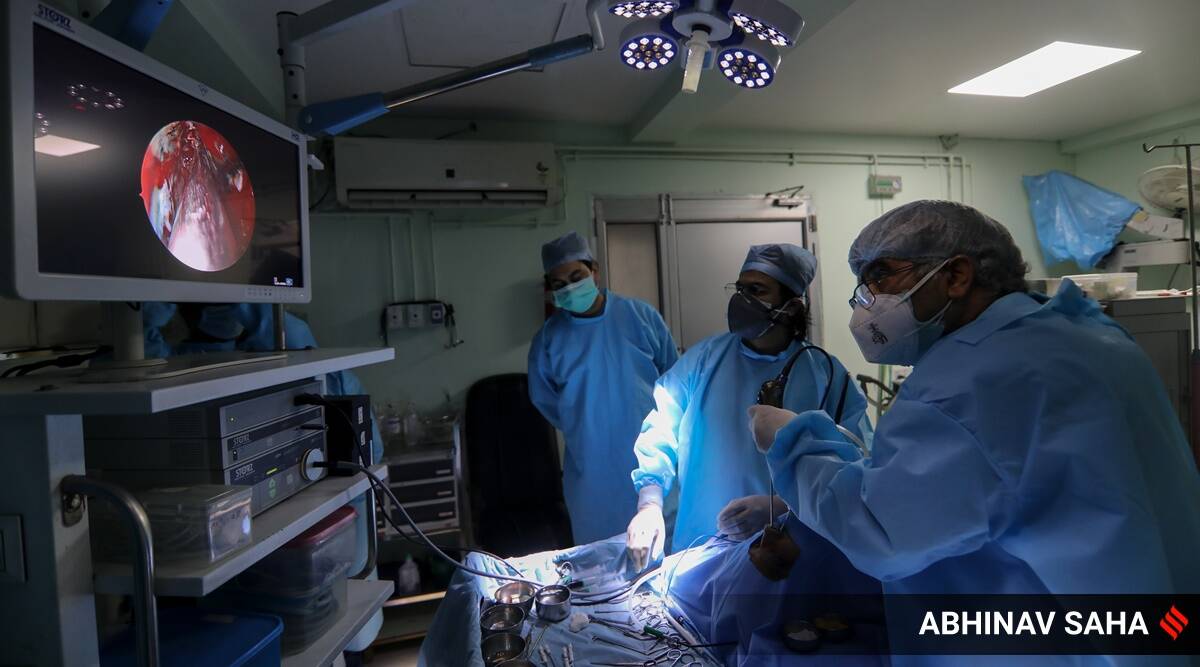Fifty-nine-year-old Hasina Bano lost vision in both her eyes within just a month.
Her hands latch on to her two sons, Mohammed Sajid and Oman Ansari, as they help her into a wheelchair inside the ward designated for mucormycosis patients at the government MBS hospital in Rajasthan’s Kota district.
“Black fungus ho gaya tha inhe (She was diagnosed with black fungus). My mother had tested positive for Covid-19 at the end of April. She gradually tested negative but complained of pain in the face. We took her to several doctors, including ENTs. Eventually, she lost vision in both her eyes,” says Ansari, who is still in disbelief over how fast the illness escalated.
“Despite surgery, her vision couldn’t be saved. We brought her back to Kota after surgery because we don’t have the means to stay in Jaipur for long. She requires prolonged hospitalisation. Till now, in over 12 days, she could be administered only four injections of Amphotericin B due to shortage of the injection,” says Sajid.
Last month, Rajasthan declared mucormycosis an epidemic. Since then, cases have steadily increased in rural as well as urban areas. The state has designated more than 30 government and private hospitals in the state for the treatment of mucormycosis.
According to data from the Rajasthan Medical Services Corporation Limited (RMSCL), the total mucormycosis cases in Rajasthan stand at 2,651 as of Saturday — the figure includes those which are suspected cases. Of this, 2,379 patients are presently under treatment across various hospitals in the state. Data shows that there have been 85 deaths from the fungal infection while 157 patients have been cured and 30 patients have left against medical advice.
The Indian Express visited government hospitals in Kota and Jaipur which are designated for the treatment of mucormycosis to witness the challenges faced by the healthcare system with increasing numbers of patients turning up every day, shortage of a crucial injection needed to treat black fungus cases and how, despite surgeries many are ending up losing vision.
“In my 20-year-long career, I had seen only around four cases of mucormycosis in the pre-Covid era, such was the rarity of this disease. But now, I am seeing 10-12 cases daily. Even for us doctors, what is very disappointing is that black fungus surgeries are not result oriented and the disease has high mortality rate,” says Dr Raj Kumar Jain, who is heading the ENT wing of the MBS Hospital in Kota.
Both mucormycosis wards in the hospital are full and around 4-5 surgeries are being carried out daily. “We can only operate the dead fungus which has already spread and start administering Amphotericin B, while hoping for a favourable outcome. All patients have Covid history and a large number of them also were diabetes patients,” says Jain.
Back in Jaipur, around 15-20 surgeries of mucormycosis patients are taking place every day at the operation theatre situated on the third floor of the Charak Bhawan, inside the sprawling campus of the SMS Hospital. Doctors say, at times the operation theatre functions for 24 hours a day due to the high case load.
“Over 500 patients have come to us for treatment. We have created a team of 20 doctors including ENT and eye surgeons and medics from other disciplines for treatment of mucormycosis. More than 150 patients are admitted at the wards,” says Dr Rajesh Sharma, superintendent, SMS Hospital, Jaipur.
Dr Anjani Sharma, associate professor, Department of ENT, SMS Medical College, adjusts his mask as he prepares for his next surgery of the day. Hospital staff wheel in a patient on a stretcher as Sharma examines his case history. “If the fungus has already entered the eyes, we have to remove the eyes in order to stop it from spreading to the brain, because then it can be fatal. The same applies for the jaw. Almost all patients require surgery because the dead fungus has to be removed,” he says.
There is silence inside the black fungus wards of SMS Hospital as men and women, with swollen eyes and faces, lie on beds.
Just two floors below, at the mucormycosis-dedicated OPD, Dinesh Kumar Meena, a councillor from Dausa district waits beside his younger brother Mahaveer, 27, who lies on a stretcher as doctors check his MRI scan reports. “My brother attended a wedding in Junjhunu district and after he returned, he tested positive for Covid. Now, he has been diagnosed with black fungus,” says Meena.
Kin of patients such as Manoj Sharma, whose mother is admitted at the MBS Hospital in Kota, say that they would go to private facilities but have come to government hospitals because Amphotericin B is not available in private hospitals.
A builder by profession, Sharma says that even at the government hospital, there is an acute shortage of injections, with a person getting a maximum of two doses a day as against the requirement of 5-6 doses every day, diminishing the patients’ chances of recovery.
Rajasthan Health Minister Raghu Sharma said the state government has asked the Centre to allocate Amphotericin B injections in proportion to the case load in individual states, but the injections received are not adequate.
Officials from the Health Department say that in terms of the present mucormycosis cases, Rajasthan needs 6,000-7,000 thousand doses every day. “At present, we are facing huge shortage of Amphotericin B. The government of India allocates each state their quota for this drug. Since May 11, Rajasthan was allocated 16,000 doses of Amphotericin B. We had received around 12,000 till now against this limit of 16,000 injections. Rajasthan is among the top 5 states nationally both in terms of number of cases and allocation. After several rounds of requests to the Government of India for increasing this quota in wake of rising cases, on Friday, 13,350 additional vials were allocated to us. Our total limit after this allocation is now 29,350 injections. We have received around 1,300 more injections already,” Alok Ranjan, Managing Director, RMSCL, which is the state nodal agency for procurement of drugs, told The Sunday Express
He added that the state government has sent a chartered aircraft to Mumbai which will bring back 1,000 vials of Amphotericin B and over the coming week, the RMSCL will procure 14,350 vials of injections.
He added that the RMSCL is trying to procure the drug from all available resources and has also floated a global expression of interest (EOI) for this purpose and have received responses from countries such as Egypt and Bangladesh.
“We have issued procurement order of 35,000 injections but aren’t able to pick them up in absence of allocation by the Central government because it’s a controlled drug. We are also trying to fill the shortage with alternate drugs such as Posaconazole, 5,000 doses of which have been distributed to hospitals,” said Ranjan.
He added that each patient suffering from mucormycosis would require a minimum of 50-60 doses of Amphotericin B.




